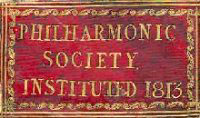During the Society’s first ever visit to New York City this month, celebratory events will be led by the New York Philharmonic, the Juilliard School and the Morgan Library & Museum. A season of concerts, exhibitions and talks under the title Philharmonic Pioneers – Beethoven, the Big Apple and Beyond will highlight the achievements of the Royal Philharmonic Society, drawing parallels with New York’s own celebrated Philharmonic tradition.
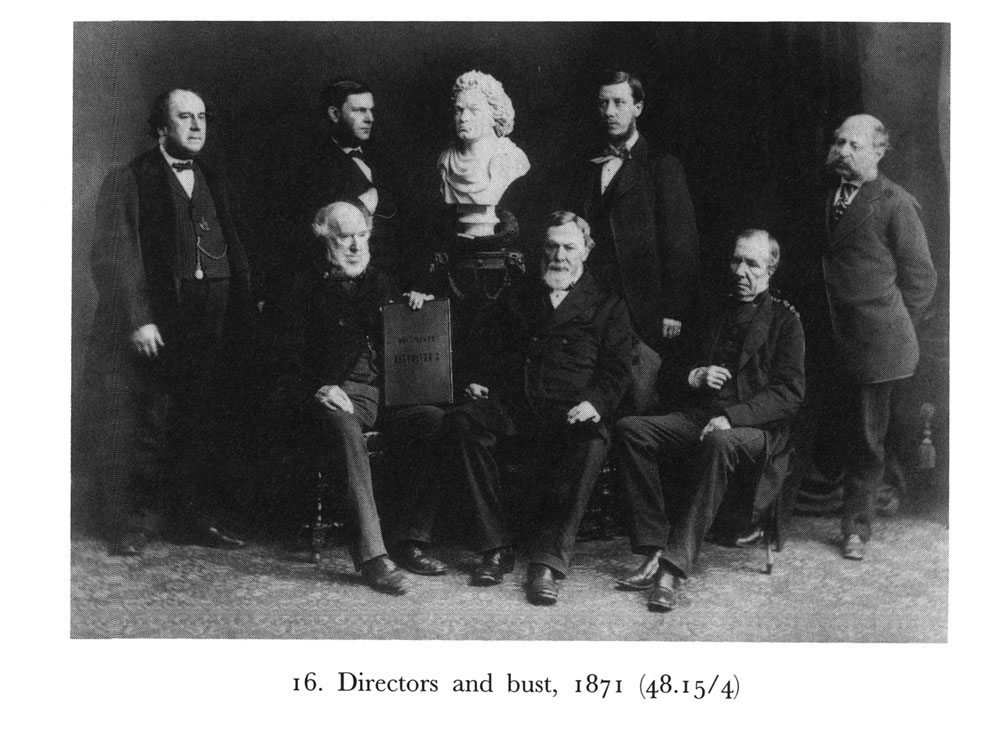
Directors of the Philharmonic Society with a bust of Beethoven by Johann Schaller, presented to the Society in 1871
Photo credit: British Library
The Royal Philharmonic Society was founded in 1813, and over the years, its own history has reflected that of two centuries of classical music in Britain, as well as further afield. “The Society,” says Chairman John Gilhooly OBE, “is for people who love music and live music making, and want to ensure a vibrant future for classical music. Founded by musicians to ‘encourage an appreciation by the public in the art of music’ with ‘one great object: the love of their art’, in founding the Philharmonic Society, British musicians opened the doors to the world’s best music and performers, and created a channel of communication that has hummed ever since. These aims hold true today, and 200 years on, we’re excited to be able to share our work, past, present and future, with New York audiences.”
The reason for Beethoven’s prominence in the New York celebrations goes back to the founding of the Royal Philharmonic Society, which had a close association with the composer. Not only did the Society premiere his 5th and 7th Symphonies, as well as his 1st, 3rd and 4th Piano Concertos, but amongst the many important works which it commissioned was Beethoven’s Symphony No 9, in 1822 – for the sum of £50.
Five years later, when the Society learnt that Beethoven was ill, and in need of financial help, the Directors arranged for a sum of £100 to be sent to him “to be applied to his comforts and necessities”. Delivery of the money was held up en route, and it didn’t reach Beethoven until a few days before he died. Nevertheless, he was able to express his heartfelt appreciation for this gift through Schindler – his amanuensis – who reported that “the Society had comforted his last days, and that even on the brink of the grave, he thanked the Society and the whole English nation for the great gift, God bless them.”
The future link between the Royal Philharmonic Society and the New York Philharmonic was established in the 1830s, when Ureli Corelli Hill – who became the founder of the New York Philharmonic in 1842 – travelled to Europe and attended concerts in London given by the Philharmonic Society. “180 years later,” says John Gilhooly, “the RPS is delighted to be making a return visit to New York City as part of its bicentennial celebrations.”
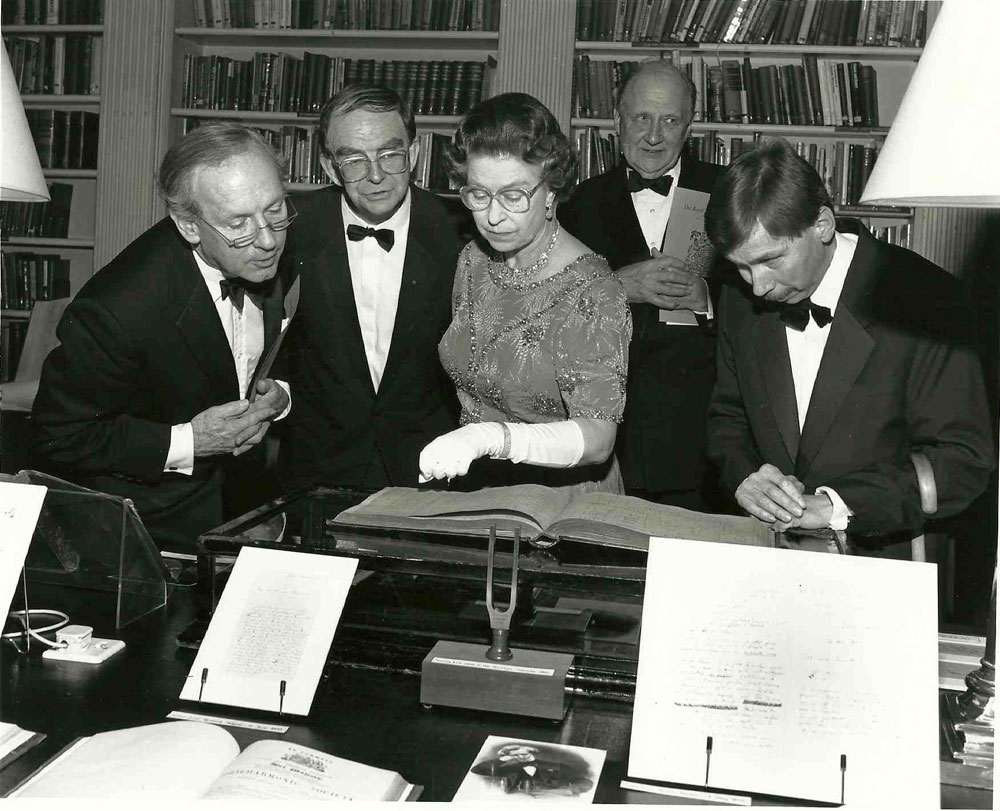
HRH Queen Elizabeth II, Patron of the Royal Philharmonic Society, is shown the copyist’s score of Beethoven’s 9th Symphony, annotated by the composer
Photo credit: British Library
The Royal Philharmonic Society – whose patron is Her Majesty the Queen – plays a key role in classical music in the United Kingdom and is still commissioning music to this day, providing assistance to young musicians, and celebrating excellence. Its work is supported by many leading musicians, amongst whom are distinguished RPS Gold Medallists Sir Simon Rattle, Dame Janet Baker, Dame Mitsuko Uchida, Thomas Quasthoff, Sir Bernard Haitink, Nikolaus Harnoncourt, Alfred Brendel, Placido Domingo, Pierre Boulez and Claudio Abbado.
The New York season, Philharmonic Pioneers – Beethoven, the Big Apple and Beyond, celebrates the genius of Beethoven, as well as the very best in new music, and also those who pioneered the Philharmonic Societies of Great Britain and New York.
Amongst the highlights will be five performances of Beethoven’s Symphony No 9 by the New York Philharmonic, led by Music Director, Alan Gilbert. The symphony will be paired with the US premiere of Mark-Anthony Turnage’s Frieze, a work which was written in response to the Beethoven masterpiece, and co-commissioned by the Royal Philharmonic Society, the New York Philharmonic and BBC Radio 3.
The Season will also feature the US premieres of new chamber works by Poul Ruders, Magnus Lindberg and Judith Weir – all commissioned by the Royal Philharmonic Society and the Britten-Pears Foundation, to coincide with the bicentennial of the RPS and the centennial of Benjamin Britten. The Ruders string quartet will be performed by New York Philharmonic musicians, and Judith Weir’s chamber work, and Magnus Lindberg’s work for Large-Scale Ensemble, will be performed by the New Juilliard Ensemble. These are just three of more than 20 new pieces commissioned by the RPS this year.

RPS Copyist’s score of Beethoven’s 9th Symphony, annotated by the composer, from the RPS Archive at the British Library
Photo credit: British Library
In addition to these performances, treasures from the Royal Philharmonic Society Archive at the British Library will be on display, firstly at the Juilliard School Library, then at the Morgan Library and Museum – the first time that these will be seen in New York. They include two original copyists’ scores of Beethoven’s Ninth Symphony – the Royal Philharmonic Society’s copyist’s score, annotated by the composer, and that of the Juilliard School’s own original copyist. The last time that these scores were seen together on public display was in 1824.
At the Bruno Walter Gallery, Avery Fisher Hall, there’ll be an exhibition exploring the pioneering spirit of the founders of both the Royal Philharmonic Society and the New York Philharmonic. Artefacts from the archives of both organisations will be on display, including materials relating to the 1846 US premiere of the Ninth Symphony, which was the first time that the Ode to Joy was translated into English – a commission by the New York Philharmonic. The original choral parts, hand-written translation, and printing plates — all of which are housed in the New York Philharmonic Archives — will be on view alongside correspondence, scores and memorabilia from the RPS Archive at the British Library. Dr Nicolas Bell, curator of the British Library Archive, will give several talks on the commissioning and creation of Beethoven’s great symphony.
The Royal Philharmonic Society Lecture will be delivered at Lincoln Center by Roger Wright, Controller of BBC Radio 3 and Director of the BBC Proms – the first time that this prestigious lecture will be given outside the United Kingdom. Entitled A Future for Music – We’re All in this Together – the lecture will impart Roger Wright’s thoughts on the future of classical music. The annual RPS Lecture, which is frequently controversial, gives leading figures an opportunity to reflect on the current shape of music and its future. Previous speakers have included Master of the Queen’s Music Sir Peter Maxwell Davies and New Yorker critic Alex Ross.
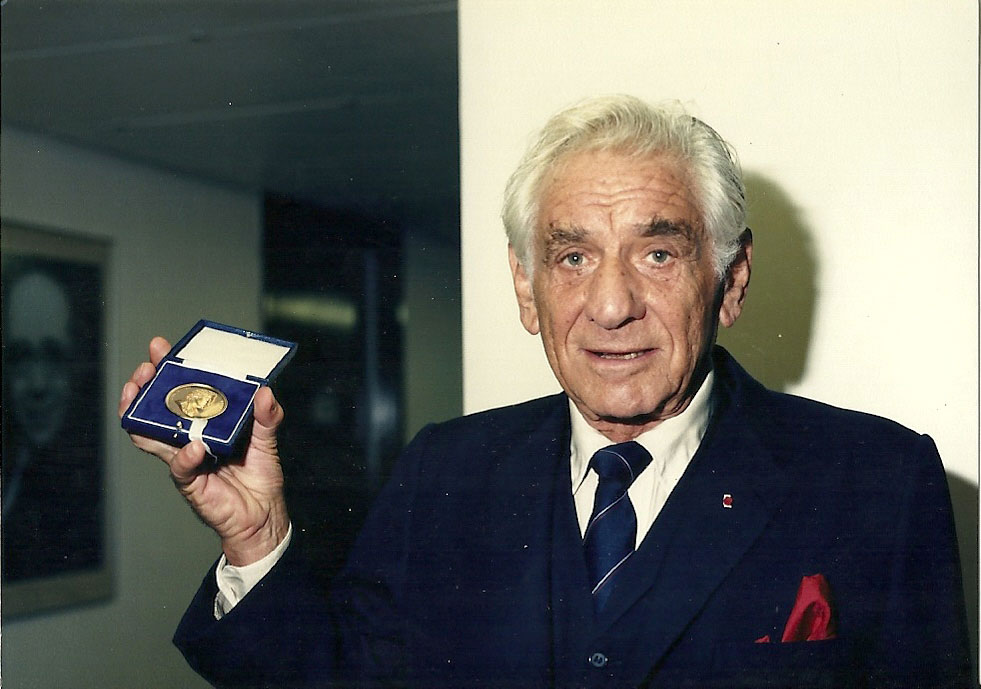
Leonard Bernstein following the presentation of his RPS Gold Medal in 1987
Photo credit: Royal Philharmonic Society
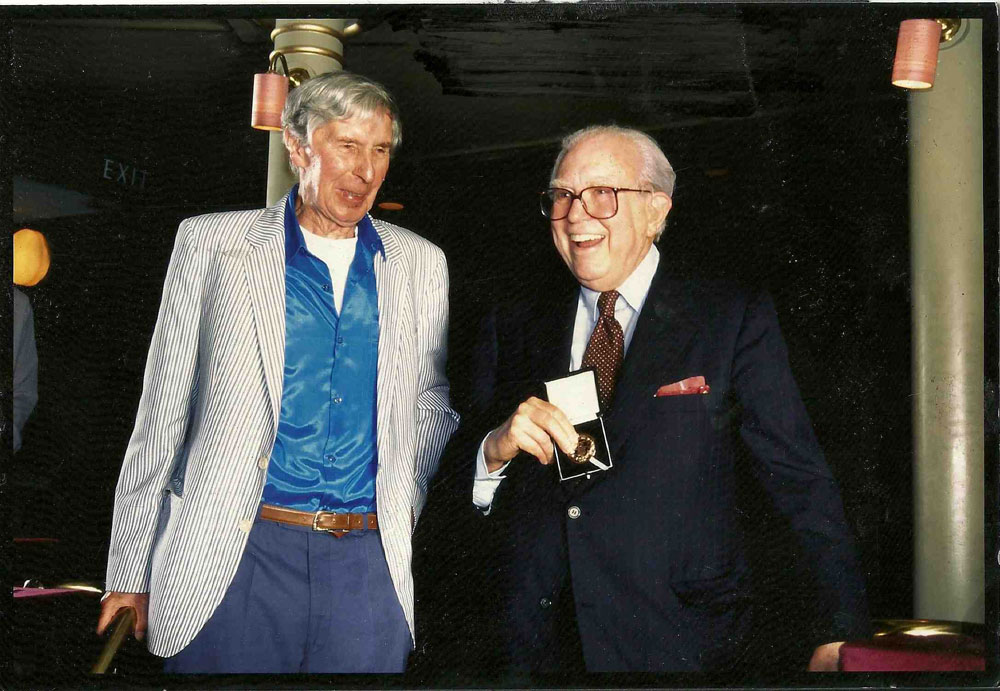
Sir Michael Tippett presenting Elliot Carter with his RPS Gold Medal in 1996
Photo credit: Royal Philharmonic Society
Speaking at the London launch of the Royal Philharmonic Society’s bicentennial celebrations, RPS Gold Medallist Alfred Brendel said: “Throughout its history, the Society has made choices which today may seem prescient, but at the time were brave and bold – wonderful pieces by Beethoven and Mendelssohn, but also by Bartók, Elliott Carter or Lutoslawski, which brought the shock of the new to audiences, yet have become part of the repertoire and continue to resonate, enthrall, or at times, tantalise and frustrate, today. Great artists never stop learning, and great musicians never stop listening. The RPS shares these qualities and I wish it well for 2013 and well beyond!”
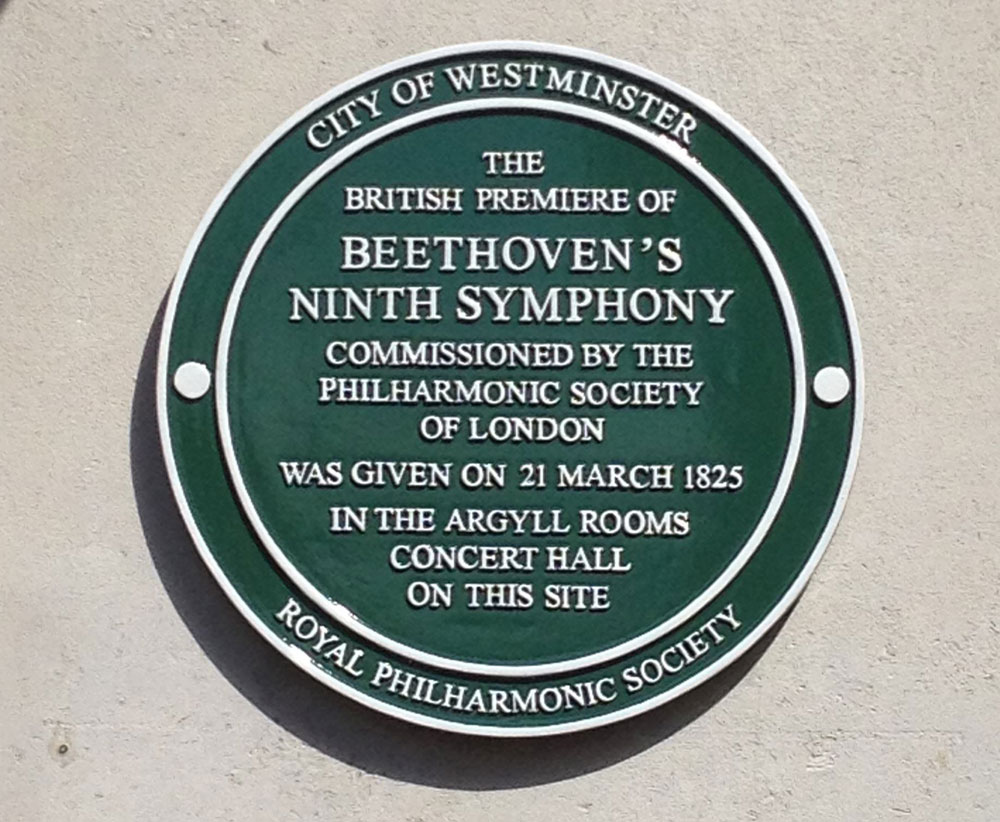
Green Plaque on the site of the first UK performance of Beethoven’s 9th Symphony
Photo credit: Royal Philharmonic Society
The Fall season of special events in New York runs from September 25th to December 1st 2013. For further information please visit the website of The Royal Philharmonic Society

![1-Philharmonic-Society-concert-poster---1870---photo-credit--British-Library[1]](http://www.artspreview.net/wp-content/uploads/2013/09/1-Philharmonic-Society-concert-poster-1870-photo-credit-British-Library1.jpg)
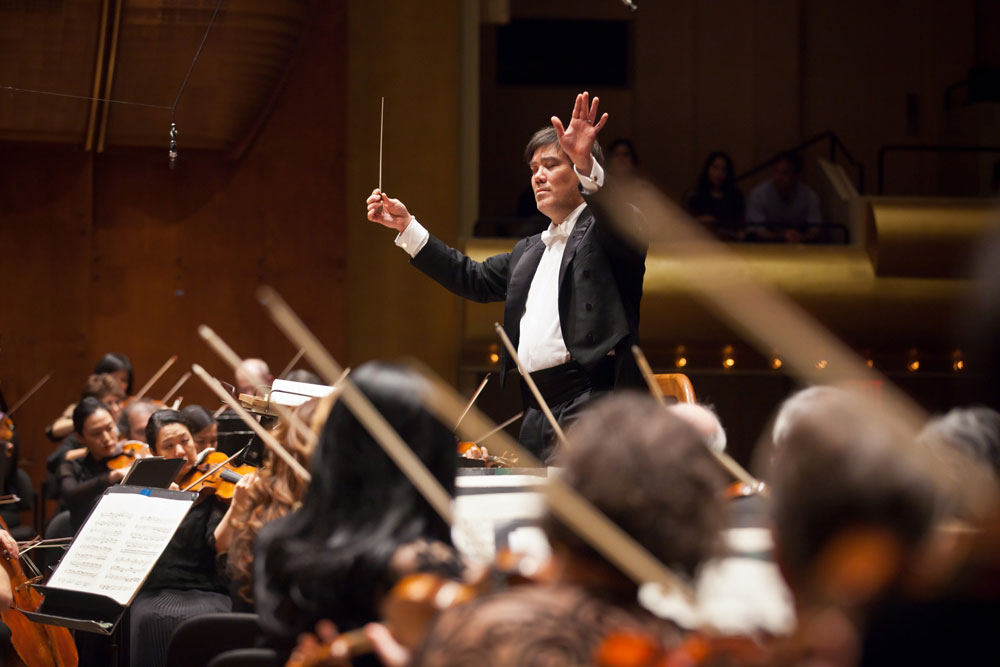
![1-Ivory-concert-tickets-belonging-to-founder-directors-of-the-Philharmonic-Society[1][1]](http://www.artspreview.net/wp-content/uploads/2013/09/1-Ivory-concert-tickets-belonging-to-founder-directors-of-the-Philharmonic-Society11.jpg)
